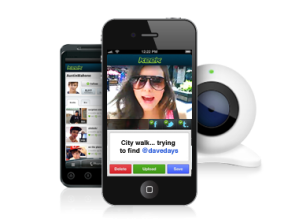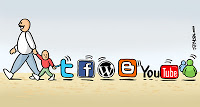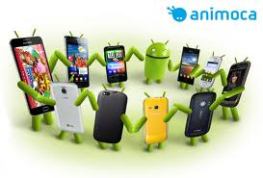Today we are steering away from the traditional sources like print, media, radio or television for information. They have now become somewhat outdated and have converged and/or mutated onto one smaller device such as an iPad. We can now control the content we wish to see or produce our own through sites such as Keek (the media platform I have been following). The people who participate in this new way of life are a prosumer which is a neologism from producer and consumer.
With the emergence of prosumers comes another new participator to the media scene, known as the citizen journalist This is a person who basically takes recording news stories and images into their own hands and distributing across multiple platforms such as Keek.
Clay Shirky’s presentation at TED asserts that “there is a new media landscape where innovation is happening everywhere and is moving from one spot to another”. He describes it as the “largest increase in expressive capability in human history”.We should keep in mind, however, with so many people uploading their own content, the creditability of the source.
When we consume a monologic style of media, there is mostly always someone filtering the message to make it pretty close to the truth, but in dialogic media and active society, everyone can write what they think and label it as true, for example posting on Facebook that there is a fire when there really isn’t.
There are times though, that this citizen journalism as helped society immensely. Take the outbreak of the SARS virus in China, for example. Janey Gordan’s ‘Convergence: The International Journal of Research into New Media Technologies‘ highlights the worth of dialogic media: that is free of ‘gate-keepers’. While the government attempted to stop the flow of information about the disease (in Beijing after investigations by the World Health Organisation was there to conduct an audit, patients were driven around on a bus), citizens were SMSing each other updates as the where the infected areas were and home remedies that they thought may work to curb the disease.
Keek, the platform I am following allows users to partake in this participatory culture. It allows users to users to share short video clips with their friends, much like Instagram allows them to do with their photographs or twitter with their information bites. It has been coined as ‘twitter for videos’. You can share a 36 second video to any one, any where in the world and wait for a ‘keekback’ (a person’s response). Keek says that they are redefining the future…
“Keek is a new kind of social network. It’s the easiest way to share video updates with friends. You can upload video status updates (“keeks”) using your webcam or the Keek app for Android and iPhone. Connect with friends, share funny videos and more. Join the social video sharing revolution!”
This is just one of the numerous platforms estbalished in this participatory culture. Whilst I believe this participatory culture is a great thing for our society, I don’t think I will be making the switch to getting all of my news on these new platforms. Below is link to a great blog that goes into more depth about participatory cultre. The video is also worth a watch to see just how much has changed (it is scary), but I warn you; it projects how this media revolution could get out of control and that is a little scary…
http://debradejong.blogspot.com.au/2012/01/about-five-types-of-prosumers.html



